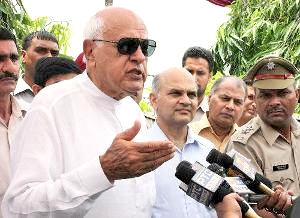 New Delhi, Dec 6: At a time when the nation is debating safety of women at workplaces, Union minister Farooq Abdullah on Friday triggered a fresh row by saying that the situation is so bad that he is afraid of speaking to women these days.
New Delhi, Dec 6: At a time when the nation is debating safety of women at workplaces, Union minister Farooq Abdullah on Friday triggered a fresh row by saying that the situation is so bad that he is afraid of speaking to women these days.
Referring to the recent indictment of former SC judge Justice AK Ganguly by the SC panel, Abdullah said, "These days, I am afraid of talking to women. In fact I don't even want to keep a woman secretary, god forbid, if there's a complaint against me and I end up in jail."
On being asked if he is blaming women for the sudden spurt in crime against them, Abdullah said, "I am not blaming women, but the society."
"Such is the state of affairs today. I agree that incidents of rape have increased...but this has to stop somewhere," he added.
Abdullah drew flak from Congress as well opposition parties for his sexist comment.
Reacting to his comment, Congress leader Ambika Soni said, "I don't expect such comments (from him)."
BJP leader Smriti Irani said, "It is a very, very demeaning comment by such a senior political leader."
His son Omar Abdullah, Jammu & Kashmir chief minister, later on tweeted, "I'm sure the attempt wasn't to trivialise important issue of women's security so I hope dad apologises for the misplaced attempt at humour."
The fallout of Farooq Abdullah's quote was immediate on social networking site Twitter.
Reacting to his statement, Trinamool Congress MP Derek O'Brien tweeted, "Dr Abdullah, what have you gone and said! Expect more sensitivity from a senior public figure. And the father of a daughter."
Social activist Kiran Bedi said, "When men say they are afraid of hiring or talking to women as Farooq Abdullah did. They are visibly a victim of their own insecurity!"
Abdullah was forced to retract his controversial statement within hours.
"If I said something that hurt sentiments then I am sorry," Abdullah said. "My comments were misconstrued."





Comments
Add new comment